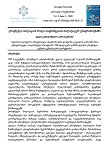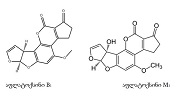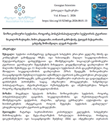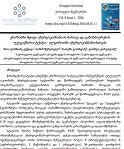ON THE RESTORATION OF THE PRE-NOSTRATIC LANGUAGE
Загрузки
The given work addresses the problem of the origin of speech and Pre-Nostratic language, which the linguists regard unsolved to this day.
Here our studies of the following issues are presented:
1. How the early men began to speak and on which basis they gave relevant names to the objects and the phenomena;
2. How did they manage to express their views?
3. What proof and the data of Pre-Nostratic language has been preserved by the Kartvelian language.
We pursue the aim of the reconstruction of the lexis of the Pre-Nostratic language, for which reason it has become necessary to study the basic words consisting of word sounds and harmonious sound complexes proved in the Kartvelian language, in other words consonants and neutral vowel O[ǝ], as well as harmonious sound complexes and a neutral vowel.
The work includes the Pre-Nostratic language vocabulary, as well as the method of restoration of the archetypes of the Pre-Nostratic words through the reconstruction of the Kartvelian words; these archetypes represented the word sounds and sound harmonious complexes prompted by the nature, which, for the expression of certain idea, formed on its part non-grammatical sentences. Here are presented the examples of forming modern words, as a result of uniting the archetypes forming part of the non-grammatical sentences and the following phonetic changes.
Скачивания
ბიბლია, (1991) ახალი აღთქმა და ფსალმუნები, სტოკჰოლმი, ბიბლიის თარგმნის ინსტიტუტი ((biblia (1991) axali aɣkhma da phsalmunebi, Stok'holmi, bibliis thargmnis instituti);
Bomhard, A. (2018) A Comprehensive introduction to Nostratic Comparative linguistics, with cpecial Reference to indo – European, volume 1.2. third revised corrected and expanded edition, florence, sc;
გამყრელიძე, თ. მაჭავარიანი, გ. (1965) სონატთა სისტემა და აბლაუტი ქართველურ ენებში,
თბილისი, “მეცნიერება” (Gamq'reliʒe, T. Mač'avariani, G. (1965) sonant't h a sist'ema da ablaut'i kharthvelur enebši, Tbilisi "mecniereba");
გამყრელიძე, თ., და სხვ. (2003) თეორიული ენათმეცნიერების კურსი, თბილისი, თბილისის სახელმწიფო უნივერსიტეტი (Gamq'reliʒe, T. Mač'avariani, G. (1965) sonant'tha sist'ema da ablaut'i kharthvelur enebši, Tbilisi "mecniereba");
Долгопольский, А. (1971-72) Какие языки родственны европейским? Наука и человечество,
международный ежегодник, 106-118.
ნებიერიძე, გ. (1991) ენათმეცნიერების შესავალი, თბილისი, “განათლება” (Nebieriʒe, G. (1991) enat h mecnierebis sesavali, Tbilisi, "ganat h leba");
ორბელიანი, ს. (1991-1993) ლექსიკონი ქართული, ტ. I, II, საქართველოს მეცნიერებათა აცადემია, თბილისი, “მერანი” (Orbeliani, S. (1991-1993) lek h sik'oni k h art h uli, t'. I, II. Sak h art h velos mecnierebat h a ak'ademia, Tbilisi, "merani");
ჩიქობავა, ა. (1950-1964) ქართული ენის განმარტებითი ლექსიკონი, ტ. I÷VIII, თბილისი, საქართველოს მეცნიერებათა აკადემია (Cikhobava, A. (1950-1964) Kharthuli enis ganmart'ebithi lekhsik;oni, t'. I-VIII. Tbilisi, Sakharthvelos mecnierebatha ak'ademia);'
ფენრიხი, ჰ., სარჯველაძე, ზ. (2000) ქართველურ ენათა ეტიმოლოგიური ლექსიკონი, თბილისი, ს. ს. ორბელიანის სახელობის სახელმწიფო პედაგოგიური ინსტიტუტი (P h enrixi, H., Sarǯvelaʒe, Z. (2000) K h art h velur enat h a et'imologiuri lek h sik'oni, Tbilisi, S.S. Orbelianis saxelobis saxelmc'ip h o p'edagogiuri instituti);
ძაძამია, მ., ძაძამია, ც. (1997) ენის წარმოშობის საიდუმლოება, ზუგდიდი, ზუგდიდის დამოუკიდებელი უნივერსიტეტი (ʒaʒamia, M., ʒaʒamia, C. (1997) enis c'armošobis saidumloeba, Zugdidi, Zugdidis damouk'idebeli universit'eti);
ძაძამია მ., ძაძამია ც., ვახანია ვ. (2007) მეგრული ენის ლექსიკა და სიტყვათწარმომავლობა, ტ. I, თბილისი, აფხაზეთის მეცნიერებათა აკადემია (ʒaʒamia, M., ʒaʒamia, C., Vaxania, V. (2007) megruli enis lek h sika da sit'q'vat h c'armomavloba, t'. I, Tbilisi, ap h xasetis mecnierebat h a ak'ademia.
Copyright (c) 2021 Kukuri Fifia

Это произведение доступно по лицензии Creative Commons «Attribution-NonCommercial-NoDerivatives» («Атрибуция — Некоммерческое использование — Без производных произведений») 4.0 Всемирная.


























































































































































































































